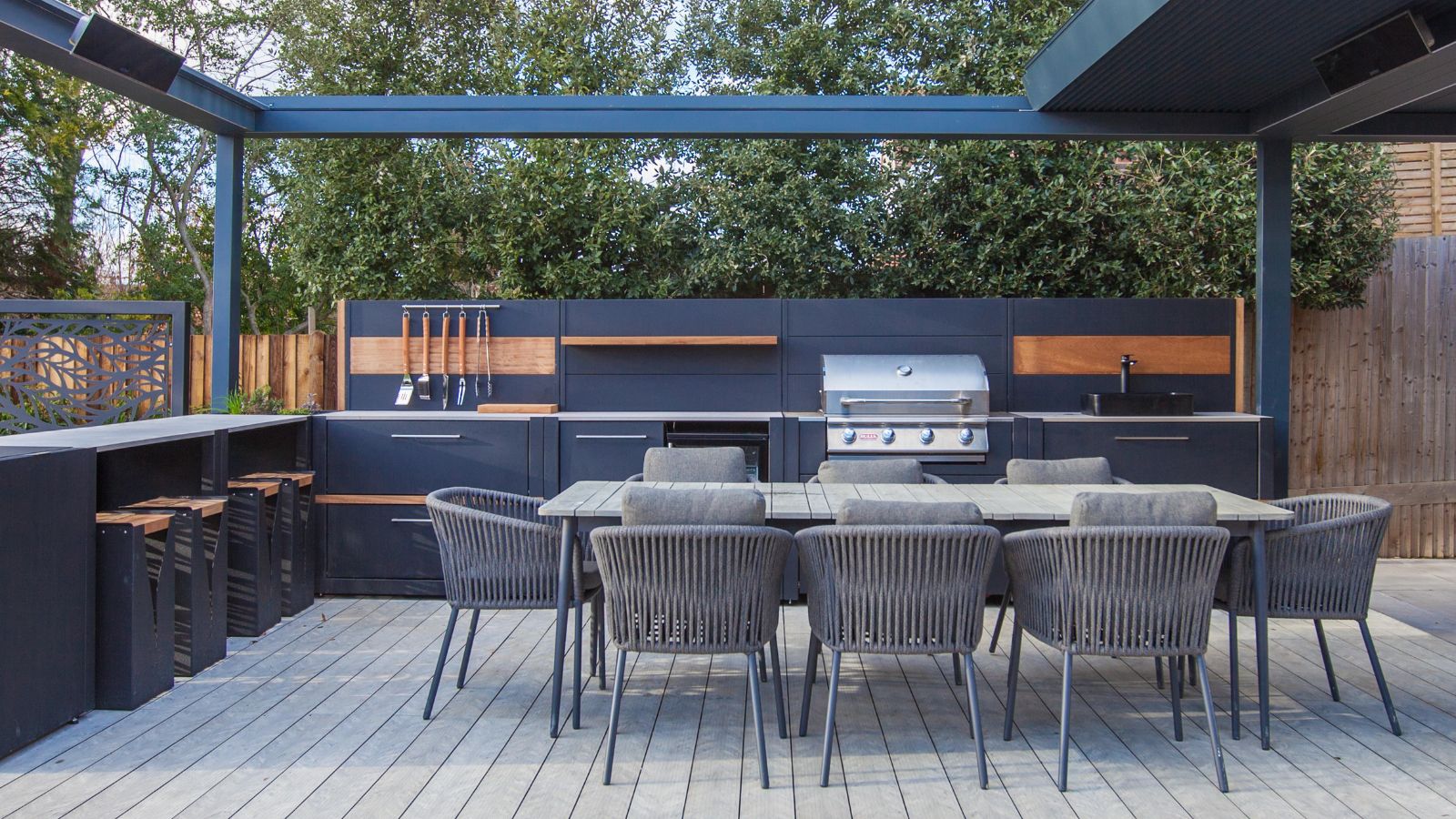How to clean an outdoor kitchen – 7 expert steps to say goodbye to grease
Maintain a spotless outdoor cook space and excellent food hygiene with these seven cleaning steps


There are few luxuries that offer the same level of practicality as an outdoor kitchen, especially if you love to host friends and family over the summer.
However, outdoor kitchens (as per their nature) are exposed to far more food contaminants than our regular cook spaces. From pollen to bugs to dust and debris, these outdoor spots need meticulous cleaning to keep them sanitary in time for summer.
We asked the professionals for their top cleaning tips for outdoor kitchens to tackle contaminants and get rid of grease for a sanitary al fresco dining season.
How to clean an outdoor kitchen
Cleaning and organizing an outdoor kitchen before summer is a must, even if you have had it covered up all winter, professional cleaners warn. Even the best cover can still let insects and grime in, so don't neglect this often overlooked outdoor cleaning task.

1. Take the kitchen apart to deep clean
When cleaning grill grates and accessories, it is useful to remove them from the kitchen and soak them to help kill bacteria and remove old grease build-up, ready for another season of cooking, says Yessica Bello, a cleaning expert at Bello’s Cleaning.
She recommends soaking them in a mix of hot water, vinegar, and baking soda with a few drops of washing-up liquid. This will help break down tough deposits so that you can scrub them off later.
‘You can then clean refrigerators and other appliances with a mild dish soap solution,’ she adds. ‘For stainless steel surfaces, I recommend a specialized stainless steel cleaner to avoid scratches.’
2. Vacuum out bugs
As much as we don't like to think about them, bugs and pests will flock to an outdoor kitchen as they offer perfect shelter from the elements. To re-establish a sanitary environment, Sofia Vyshnevska, a home maintenance expert, COO and co-founder of NewHomesMate recommends vacuuming every nook and corner of the kitchen before wiping the cabinets out with a disinfecting spray:
‘They tend to like the dirty hidden areas of the kitchen we forget to clean, so use a vacuum cleaner with a hose attachment to remove any insects, spider webs, and debris from the nooks and crannies,’ she recommends.
3. Don’t forget the vent hood
If you have a vent hood, you will want to check this over for insects too, removing the filters and grates to give them a thorough clean and vacuum before drying and reassembling, Sofia Vyshnevska continues.
‘People often forget about the vent hood because they can’t see all the dust and grease inside. Not only does it reduce its efficiency, but it can cause a fire if too much grease builds up. To clean a range hood, spray it with a degreaser and give it a good scrub – inside and out – until it looks new again.'
4. Inspect for damage
A common outdoor kitchen mistake is forgetting to check for damage. We might not use outdoor kitchens as often as our indoor spaces, but being out in the elements means these spots are likely to wear down more quickly than we realize. When cleaning, Yessica Bello, a cleaning expert, suggests checking over any important safety spots, such as gas lines, to ensure everything is in safe working order before you plan your summer parties.
‘Check for water damage and leaks, especially around plumbing and wooden surfaces. Re-seal wooden areas to protect them from future moisture damage and ensure longevity.'
5. Remove food residue after every use
After every use, you need to clean kitchen grease to prevent tough build-up that will be harder to clean the longer it sits. ‘For cleaning after each use, always start by scraping off any food residue from the grill grates and burners with a grill brush, then, wipe down surfaces with a mild degreaser such as Simple Green All-Purpose Cleaner, available at Walmart, says Lina DaSilva, cleaning expert and owner of Toronto Shine Cleaning.
‘Finally, clean and sanitize any countertops with a bleach-free cleaner to keep the area hygienic.’
6. Use cooking oil to avoid rust
If you have ever tried to remove rust from metal garden furniture, then you will know how tricky it can be. To save time, it is a good idea to prep your space to prevent rust and avoid contaminating food.
‘You can use vegetable oil, canola oil, or peanut oil and spread a thin layer on the surfaces,’ suggests Rhonda Wilson, quality lead cleaner at FreshSpace Cleaning. ‘For grill grates, just pour some oil on a paper towel and wipe it all over. If you’re storing them, clean them up, heat them a bit, and then apply the oil before putting them away.’
If you have found rust, you will need a commercial rust remover to ensure it is all cleaned away before cooking, she continues. ‘After you’ve cleared the rust, rinse and dry it thoroughly. Once it’s dry, add a light layer of cooking oil. And if you can, store them in a dry spot to minimize moisture exposure.’
7. Empty trash cans after every use
One of the easiest ways to prevent pests and keep your outdoor kitchen in top condition is to remove anything that might lure bugs and animals to your cook space. Alongside deep cleaning after use, removing trash cans and emptying out waste is the easiest way to do this, says Emily Adams, cleaning expert at NW Maids.
‘Clean the bins with warm soapy water and let them dry before replacing the liners,’ she adds.
FAQs
How to prevent an outdoor kitchen from rusting?
If you want to avoid rust and water damage to your outdoor kitchen, consider using a tightfitting cover in winter, and using an overhead cover such as a roof or pergola to block the majority of the elements.
How long do outdoor kitchens last?
An outdoor kitchen, when properly looked after, cleaned, and protected from the elements, can last 10 years or more. This can vary depending on the materials used, however, so consider investing in the highest quality you can afford to get the most out of your investment.
When planning an outdoor kitchen, consider how you will keep it protected from the elements over winter and how you will prevent pests and contaminants making it difficult to clean before use. Picking the best cabinets for an outdoor kitchen, for instance, will make it easy to wipe down, while picking tight-fitting covers and locks for storage will prevent larger pests from making it their home over winter. It won’t negate the need to clean, but it will make the process a lot smoother.
Sign up to the Homes & Gardens newsletter
Design expertise in your inbox – from inspiring decorating ideas and beautiful celebrity homes to practical gardening advice and shopping round-ups.

Chiana has been at Homes & Gardens for two years and is our resident 'queen' of non-toxic living. She spends most of her time producing content for the Solved section of the website, helping readers get the most out of their homes through clever decluttering, cleaning, and tidying tips. She was named one of Fixr's top home improvement journalists in 2024.
-
 5 things professional cleaners always do to overcome a cleaning roadblock – they're surefire ways to feel 'motivated and clear-headed' experts say
5 things professional cleaners always do to overcome a cleaning roadblock – they're surefire ways to feel 'motivated and clear-headed' experts sayGet your cleaning schedule back on track
By Ottilie Blackhall
-
 Martha Stewart used this vintage-style pan to make cute bunny cakes for Easter – it's a real heirloom piece (and only $40 now)
Martha Stewart used this vintage-style pan to make cute bunny cakes for Easter – it's a real heirloom piece (and only $40 now)It's not Easter without bunny-themed baked goods, and Martha set a precedent with a novel cake pan – it's American-made and has exceptional durability
By Megan Slack